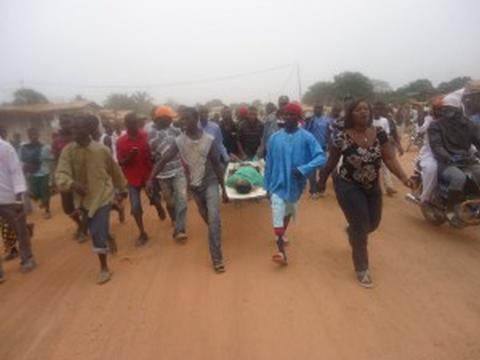By Septimus Senessie in Kono
Human Rights Commission of Sierra Leone (HRCSL) was in Kono at the weekend on a fact- finding mission after two people were shot dead in a violent three-day strike action by local staff of diamond miner, OCTEA mining group. Dozens were injured with some alleged to have sustained gunshot wounds. Chairman of the commission, Reverend Moses Kanu, told a meeting at the UN conference hall in Koidu that their visit was not in any way to “witch hunt anyone, but to establish facts on the causes of the strike action between the management of the company and their junior staff which led to the killing of two people and those who sustained bullet wounds during the riot.” He encouraged his audience to come out with unbiased information connected to the strike actions for possible solutions. He also disclosed that he had engaged Paramount Chief Paul Gabba Saquee of Tankoro chiefdom, the company and leaders of the mine workers in police custody. When asked what their findings were since they arrived in Kono he told Politico that they would not disclose such information for the time being but promised they would do so after compiling their findings which would be accompanied by general statements and recommendations for government action. He said that a similar thing was done following the killing of one person during a similar strike in Bumbuna at another mine. Explaining to the commission on the genesis of the strike, the chairman for the Coalition of Civil Society Network in Kono District, Arthur Kargbo said “the first and second day of the strike between the junior staff and the management of OCTEA Diamond Group were peaceful until the visit by the minister of mines and mineral recourse and his entourage to Kono”. He alleged that the minister could not manage the situation well causing the aggrieved workers to react violently by throwing stones at his convoy. He maintained that the aggrieved workers did so because they thought the minister who had apparently spent the whole day with the management of the company and used their vehicles to address them had already “compromised with the company.” He pointed out that “police who are the security for lives and property reacted negatively by firing tear gas and life rounds which though resulted to the killing of two and several others sustaining bullet wounds.” The chairman maintained that the victims were abandoned in hospitals without proper medical treatment and the leaders of the mines workers were in police custody, while the police officers, alleged to have killed those two innocent people, continued to work as free men in the community. He brought to the attention of the commission a press release issued by the government with so much protection for the company, instead of her citizens. Kargbo observed that after the press release, the company resumed work with immediate effect. He also noted that hundreds of the striking workers had been blacklisted and about a thousand of them had been dismissed under the guise of long term leave. He called for the establishment of an independent human rights enquiry to look into the matter, bring to justice those who killed the two people after the enquiries, adequately address those issues that brought the strike action to prevent future occurrence, grant bail to the present detainees and legal representation made available to them, provide adequate compensation to the bereaved families and provide corporate legal assistance for them to sue the company for allegedly violating the rights of employees and failing to comply with international best practice as an obligation regarding Kimberlite mining operations. The HRCSL team also met with senior officials at the OCTEA Group who reportedly declined to comment, referring them instead to their Chief Communication Officer, Ibrahim Sorie Kamara in Freetown.








